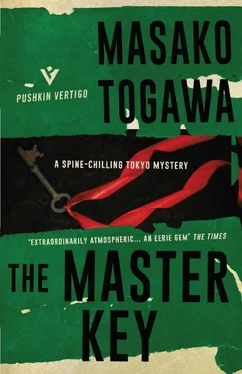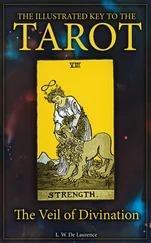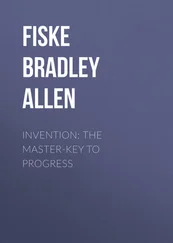She poured a little soy-sauce into the casserole and, picking up a fish by its tail, used it to stir the brew. The silence of the room was broken by the bubbling of the pot and the sound of her sucking the fish scraps and slowly munching the bones.
The meal—if such it could be called, for it was to her more of a cure—lasted for about an hour. Then she rose from the pile of newspapers which served her as a chair and opened the sliding door of her storage cupboard. Picking up the lampstand with its trailing flex and tiny bulb, she carried it as if it was a candlestick and entered the cupboard.
Her bed made up the bottom half. The sides of the cupboard, and her bedding too, were covered with a fine white powder. It was DDT, which she sprinkled regularly, fearing that her unmade bed would otherwise become a breeding ground for insects. She wanted to keep her person, at least, clean. Her bed consisted of three under-mattresses, covered by a sheet which was so worn that the pattern of the cloth below showed through. A permanent hollow was worn in the centre, which fitted her body to her satisfaction. Above this were spread an ancient blanket with dirty edging and a heavy quilt, the stuffing of which had worked its way into the four corners, leaving nothing in the centre except the covering material. This deficiency was remedied by piling old newspapers on top of where the kapok should have been. The whole arrangement was a grubby chaos, but at least the bed was warm.
Noriko put the lamp on an old orange box by her pillow, closed the sliding door and sat on top of the bed. Now that two doors separated her from the outside world, she felt at peace—just like a mouse in its nest. She reached into the orange box and took out a tea-caddy which she up-ended, scattering its contents on the bed. An old brooch, a broken wrist watch, a magnet, a fragment of a mirror—the sort of rubbish a child would collect—such were her treasures. But amongst them was the master key with its wooden tally. She took it up, discarding the rest, and laid it on her pillow. Since finding it in the lock of her door a week before, she had taken it out and examined it every night, pondering on the reason for its having turned up there.
Just as a mouse will carefully examine the bait in a trap, occasionally touching it with its forepaws, so Noriko now inspected the key, picking it up from time to time and then replacing it on the pillow. One thing at least was clear to her: the loss of the master key having been announced on the noticeboard downstairs three days before, there was no possibility of her now returning it without incurring suspicion. But she could think of no way in which she could use the key for her own purposes.
Having adopted the life of an animal, her instincts were enough to convince her that this master key was something dangerous, boding ill-fortune for her.
The stolen violin
The child was plainly bored. He stood self-confidently before the music stand, but it was clear that he had no real interest in the violin in his hands, and that his concentration was straying. When the instructor was demonstrating the correct way of playing, instead of fixing his attention on the bow he would from time to time sneak a glance at her out of the corner of his eyes.
Suwa Yatabe stood stiffly erect, her head inclined to the left the better to grip the violin under her chin and, putting all her skill into the playing, swept the bow from side to side in an exaggerated manner so that the child could understand what she was trying to teach him. Her knuckles stood out under her lacklustre skin and her fingers quivered mincingly up and down the strings; nonetheless, they seemed to dance like living things. They gave away the fact that their owner, although now condemned to play and listen to such pedestrian sounds, had once been one of the leading Western musicians of Japan, a lady violinist of breathtaking skill whose performances had often brought the house down.
The child stared at those so-correctly positioned fingers. Her little finger and ring finger pressed down the strings, whilst her index finger hopped up and down all the time, touching lightly on their surface. Her middle finger stood stiff and motionless, without ever seeming to give way to the instinct of moving. The child found this fascinating, and wanted to ask his teacher how she could accomplish this but fought back against the temptation, remembering that his mother had told him it was rude to draw attention to people’s physical peculiarities.
Suwa Yatabe was aware of the child’s impertinently curious gaze, but today it did not trouble her. She was herself interested in the powers of observation possessed by this highly strung boy.
Most of her pupils were children who lived nearby, those whose parents wanted them to pass the time in something more than mere play or who were sent merely because there was a violin at home on which they could practise. Mothers who could not afford a piano would give their child a small violin and send him or her off to study this fashionable instrument under Suwa. Her fees were extremely low. She had started teaching friends’ children as a favour when she experienced boredom after retiring from her post as a music teacher at a girls’ school; imperceptibly, as the word got around, numbers had swelled and now her apartment had more or less become a classroom. The number of pupils seemed to have reached a natural ceiling, and thereafter neither grew nor diminished: everyday, four or five children came for lessons.
Since leaving the world of the concert hall, Suwa Yatabe had suffered the chagrin of seeing the names of her former colleagues in the newspapers, and even though she was now over sixty she still felt the agonies of the frustrated artist. So, whilst teaching her pupils, she would torment herself with the thought that perhaps amongst these children there might be one in whom some latent genius lay concealed from her eyes. But at such moments the child whose practice of the necessary passages in Holman’s Primer did so much for his mother’s self-esteem, would appal the ears of the once-famous accompanist who taught him, such were the cacophonous sounds of his violin.
But the child who was with her today was different. At the very least, Suwa thought, he was better than the neighbourhood children who were her other pupils. He had been brought by his mother for the first time a week before—they lived a couple of stations away on the underground—and Suwa had detected some feeling for music in him. Of course, his accomplishment was patchy, but her long experience told her that the child had potential talent. Such a child had to be taught to the best of her ability.
‘Well, listen to this, and listen carefully.’ She rapped the music stand with her bow to attract the child’s attention. He gazed at her timidly. ‘Why does your finger not move, Teacher?’
She looked at the middle finger of her left hand. It had suddenly become paralysed when she was in her mid-thirties, at the height of her musical career, and she no longer regarded it as being part of her. She felt revive within her the terror and mortification of those days when she had first realised that the finger would no longer move. The doctors had been able to do nothing about it. They said that there was nothing really wrong with her finger, except that it would not bend. There was no medical cause that they could find.
Over the thirty years since then, Yatabe Suwa’s life had been changed by the circumstance of her paralysed finger. Because of it, she had been forced to abandon her musical career and to become a mere teacher. It was only natural that she resented any questioning about it by others. On the surface, it was because she could find no answer to the question ‘Why?’ But deep in her subconscious she felt that she knew the answer; there it lurked, and there she preferred to leave it…
Читать дальше












